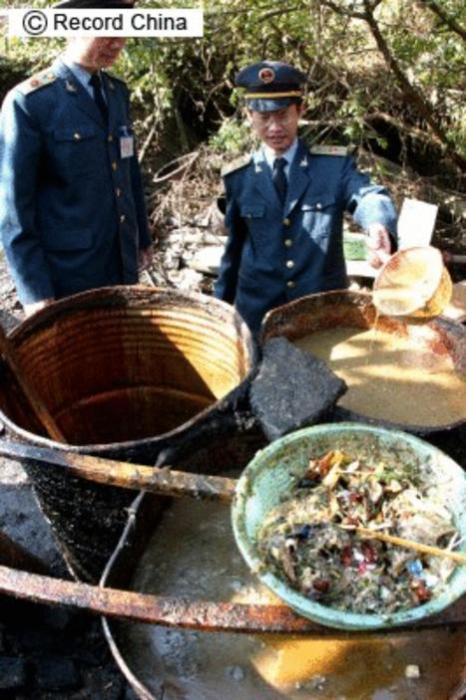05-03-2010, 04:42 PM
0
All articles from Sankaku Complex.
Quote:The news that a tenth of all cooking oil used in China may be made from recycled sewage and laced with toxic contaminants has stunned China.
Originating from a report on a state radio station, the news that “Chinese are eating 3,000,000 tons of ‘recycled cooking oil’ each year, but it is 100 times more toxic than arsenic!” spread throughout China in a matter of days.
The cooking oil is apparently “recycled” from raw sewage taken from sewers and elsewhere, which is heated and filtered. After filtration the liquid is transparent and free of particulate matter, and can be rendered into cooking oil.
Fears over the toxicity of the recycled oil are high. Significant levels of aflatoxins have been detected, a poison said to be “100 times more toxic than arsenic,” and known to cause growth defects in children and cancer.
Viral and bacterial contaminants are thought not to be a problem, assuming the sewage-oil is properly boiled in preparation.
Despite the obvious hygiene and safety problems of using treated sewage in cooking, its usage is thought to be widespread, as the “recycled” cooking oil is all but indistinguishable from normal cooking oil, in all but one aspect – its price.
It costs only 300 yuan ($45) a ton to manufacture, half the price of regular oil, and it is said to be common use throughout China – estimates are that it constitutes a tenth of all cooking oil used in China.
Chinese food safety regulators, such as they are, launched an immediate emergency investigation, although it is not clear if they actually previously approved the activity.
China’s record on food safety is of course already utterly abysmal, but if as widespread as reported this could turn out to be the most damaging scandal to date, as cooking oil is an integral part of food preparation in China.
Nations importing cheap cooked foodstuffs from China may also be concerned that they have been inadvertently poisoning their children by trading with a nation in which regulation and business ethics are all but unknown.
64469__468x_chinese-cooking-oil-made-from-raw-sewage-001.jpg (Size: 28.73 KB / Downloads: 20)
64474__468x_chinese-cooking-oil-made-from-raw-sewage-006.jpg (Size: 46.14 KB / Downloads: 20)

Quote:A Chinese food stall caught serving the liquids collecting in the bottom of their rubbish bin as soup has disgusted Chinese observers.
The horrified witness who photographed the scene described what was happening:
Quote:“All the waste went into the bin as well as the liquid from the sink – and the chef was topping up soup bowls using this rubbish. It was really disgusting and it’s no wonder so many people are sick eating from such stalls.”
Local food hygiene officials claimed to have taken action against this “recycling”:
Quote:“We have confiscated the stalls license and the owner will be prosecuted. He said he did not realise recycling oil as it floated to the top of the liquid in the bin was an offence.”
As the oil was quite possibly made from sewage in the first place, it seems Chinese diners would scarcely be any worse off if they were to just boil themselves a bowl of sewage as soup and eschew the pretense of hygiene altogether.
With even the most rudimentary ethical standards of not outright murdering their customers completely absent from the bulk of Chinese businesses, China and the world beyond can be forgiven for worrying about the direction Chinese economic development is taking them.
66503__468x_chinese-rubbish-soup-1.jpg (Size: 28.27 KB / Downloads: 20)
66504__468x_chinese-rubbish-soup-2.jpg (Size: 28.59 KB / Downloads: 20)
Quote:The latest food scandal to outrage Chinese net users involves nutritious celery being soaked in sewage to increase its weight for market.
The pictures in question, taken in the city of Nantong in Jiangsu province, show a farmer preparing a celery crop for market by soaking them in a pond for over 3 hours to increase their weight and subsequent sale price (itself illegal).
Naturally the pond is full of raw sewage and filled with floating garbage.
The individual clandestinely recording the scene reported a foul stench rising from the rubbish laden pond, and that farmers routinely soaked their crops there before taking them to the wholesale market for distribution.
Food for thought – particularly considering the scale of Chinese food exports to developed countries.
68356__468x_chinese-sewage-celery-001.jpg (Size: 23.92 KB / Downloads: 20)
68360__468x_chinese-sewage-celery-005.jpg (Size: 71.15 KB / Downloads: 20)
68365__468x_chinese-sewage-celery-010.jpg (Size: 35.78 KB / Downloads: 20)
























![[Image: alcatraz-prison-picture2-1.jpg]](http://i17.photobucket.com/albums/b78/lktraz/Sigs%20and%20Avs/alcatraz-prison-picture2-1.jpg)
![[Image: dont_care_offended.gif]](http://i17.photobucket.com/albums/b78/lktraz/Sigs%20and%20Avs/2012%20Bumper%20stickers/dont_care_offended.gif)